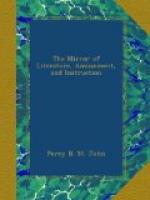This custom can scarcely fail to recall to the recollection of the intelligent reader, the analogous practice among the Negroes of Africa, mentioned by Mungo Park, under the denomination of the mysteries of Mumbo Jumbo. The two customs, however, mark, in a striking manner, the different situations of the female sex in the northern and middle regions of the globe. From Tacitus and the earliest historians we learn, that the most ancient inhabitants of Europe, however barbarous their condition in other respects might be, lived on terms of equal society with their women, and avoided the practice of polygamy; but in Africa, where the laws of domestic society are different, the husbands, as the masters of a number of enslaved women, find it necessary to have recourse to frauds and disgraceful severities to maintain their authority; whereas in Europe we find, among the common people, a sanction for the women to protect each other, by severities, against the casual injustice committed by the ruling sex.
CHARLES STUART.
* * * * *
NOTES OF A READER.
* * * * *
CHRISTMAS SCRAPS.
We have spiced our former volumes, as well as our present number, with two or three articles suitable to this jocund season; but we cannot deny ourselves the pleasure of adding “more last words.” People talk of Old and New Christmas with woeful faces; and a few, more learned than their friends, cry stat nominis umbra,—all which may be very true, for aught we know or care. Swift proved that mortal MAN is a broomstick; and Dr. Johnson wrote a sublime meditation on a pudding; and we could write a whole number about the midnight mass and festivities of Christmas, pull out old Herrick and his Ceremonies for Christmasse—his yule log—and Strutt’s Auntient Customs in Games used by Boys and Girls, merrily sett out in verse; but we leave such relics for the present, and seek consolation in the thousand wagon-loads of poultry and game, and the many million turkeys that make all the coach—offices of the metropolis like so many charnel-houses. We would rather illustrate our joy like the Hindoos do their geography, with rivers and seas of liquid amber, clarified butter, milk, curds, and intoxicating liquors. No arch in antiquity, not even that of Constantine, delights us like the arch of a baron of beef, with its soft-flowing sea of gravy, whose silence is only broken by the silver oar announcing that another guest is made happy. Then the pudding, with all its Johnsonian associations of “the golden grain drinking the dews of the morning—milk pressed by the gentle hand of the beauteous milk-maid—egg, that miracle of nature, which Burnett has compared to creation—and salt, the image of intellectual excellence, which contributes to the foundation of a pudding.” As long as the times spare us these luxuries, we leave




